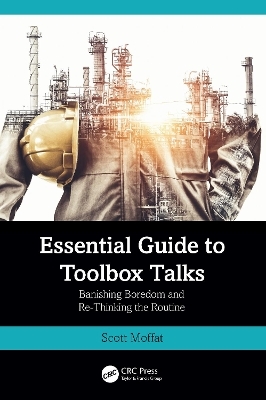
Essential Guide to Toolbox Talks
CRC Press (Verlag)
978-1-032-78494-6 (ISBN)
A Toolbox Talk (TBT) is a pre- job task made to ensure all parties involved in a task have full understanding of what they should do. TBTs are not easy; however, the author hopes this book will provide the right guidance to make TBTs less daunting, and easier to use. They are not a tick- the- box exercise; therefore, please do not treat them as such. This book challenges this perception and puts forth a case to consider TBTs essential to delivering safe working environments, thereby providing a complete understanding of the task.
Essential Guide to Toolbox Talks focuses on improving three Non- Technical Skills (NTS) related to TBTs: Communication, Situation Awareness and Stress Management. With communication the book looks at the impact of inappropriate questions, allowing time for questions/ feedback, use of familiarities and knowing the answer and the errors that can occur. For situation awareness, the author conveys that effective communication enhances the environment in which people work, checking that the group understands the tasks; further coverage of what to do when things go wrong underpins this. Finally, it covers stress management and how important it is to confirm people know what to look for during a TBT and what to do if they believe a team member is under stress. With the onus on these three vital NTS, the reader will be able to deliver focused and much- improved TBTs that guarantee safe and effective performances in the workplace.
This neat and punchy book will change that tick- the- box perspective of the TBT. It will appeal to both practitioners in Human Factors and anyone at the front line in high- risk industries where TBTs are a requirement, especially those in oil and gas, nuclear, construction, logistics, transport and aviation who will be certain to consider it an essential guide.
Scott Moffat, having a varied background since working offshore, is one of the leading experts within the NTS discipline. To date, he has observed over 100 groups in simulation exercises, over 90 external simulations and over 50 offshore NTS observations. All of this data plus his working background makes Scott feel just as at home in the simulator as he does offshore and thrives in sharing this knowledge with new groups. Although he has a strong understanding of all the NTS – his area of interest lies in helping those on the front line understand and apply Communication, Situation Awareness and Stress Management. Recently Scott has developed and facilitated a unique programme of TBT coaching across the Oil and Gas Industry building on his own experience offshore, in the classroom and through the observation of hundreds of TBTs over the years. Scott’s unique ability to blend theory with context and humour make this vital reading for anyone looking to improve their knowledge or understanding of TBTs.
Acknowledgments
Acronyms/Offshore phrases/ Scottish slang/words
Chapter 1 – Introduction
Who am I, or more importantly who/what am I not?
Chapter 2 – Introduction to NTS.
Six Non-Technical Skills:
Which of these six NTS do you think you will be good at?
“Which of the NTS do you think you do not need to know anything about?”
“Why are you only examining three NTS?”
“What do you know about TBTs?”
Chapter 3 – Communication
Inappropriate questions:
Knowing the answer: gorillas in the mist sates p.22) hand signals
Allowing time for questions and feedback:
Define what is meant by the term Communication:
Use of familiarities:
We can read each others minds:
Get everyone involved:
Communication Must do’s:
Chapter 4 – Situation Awareness
How do we know the brain/working memory is doing what it is programmed to do?
Most common Situation Awareness errors during a TBT:
Lack of detail about what to do if something were to go wrong.
Not discussing distractions or how to deal with distractions
Inappropriate 20 second scan
What I always thought was the obvious one, but not always: Hold a TBT at the worksite
Situation Awareness Must do’s:
Chapter 5 – Stress management
What is stress and why is it so difficult to define?
Different types of Stress
There are four main ways to identify Acute stress:
Stress Management – Must Dos
Chapter 6 – Summary of all key points from all sections:
Index
| Erscheinungsdatum | 22.08.2024 |
|---|---|
| Zusatzinfo | 2 Line drawings, black and white; 2 Illustrations, black and white |
| Verlagsort | London |
| Sprache | englisch |
| Maße | 156 x 234 mm |
| Gewicht | 140 g |
| Themenwelt | Geisteswissenschaften ► Psychologie ► Allgemeine Psychologie |
| Geisteswissenschaften ► Psychologie ► Arbeits- und Organisationspsychologie | |
| Naturwissenschaften ► Biologie ► Ökologie / Naturschutz | |
| ISBN-10 | 1-032-78494-6 / 1032784946 |
| ISBN-13 | 978-1-032-78494-6 / 9781032784946 |
| Zustand | Neuware |
| Haben Sie eine Frage zum Produkt? |
aus dem Bereich


